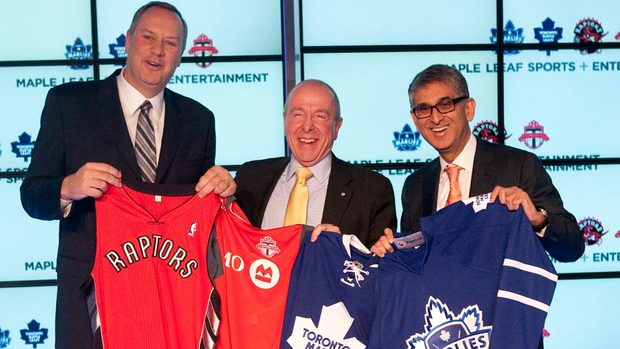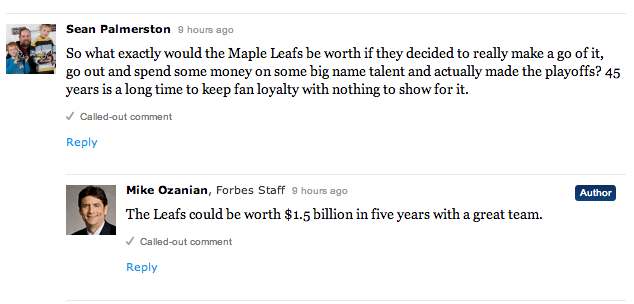Forbes released their annual NHL franchise valuations today alongside an article detailing the financials of league’s 30 teams. Unsurprisingly, the Toronto Maple Leafs top the list ” by a lot. With the recent sale to Bell/Rogers, the value of the team became more concrete and Forbes has estimated they are worth $250,000,000 more than the next team, The New York Rangers. Simply staggering numbers. The Leafs are the first team to break $1 billion dollars in value.
On the ice, the National Hockey League has never been more competitive than it has been over the course of its of its last collective bargaining agreement that began with the 2005-06 season. A different team has won the Stanley Cup each season, with the champion coming from big markets like Los Angeles and Chicago, as well as small ones such as Pittsburgh and Raleigh. A total of 12 different teams reached the finals during the seven-year CBA.
So why have the owners thus far cancelled 422 regular season games of the 2012-13 season, as well as the All Star Game, insisting on a new CBA that drastically reduces the amount of money (currently 57% of hockey-related revenue) that can be spent on player salaries?
The reason is because on the financial scoreboard, the league—s 30 teams have never been further apart.
Consider the two most recent team sales. In May, Tom Stillman acquired the St. Louis Blues, the team—s American Hockey League affiliate, the Peoria Rivermen, the lease to Scottrade Center, and a piece of the Peabody Opera House for just $130 million. One month later, the NHL approved the Ontario Teachers— Pension Plan sale of its controlling interest in Maple Leaf Sports & Entertainment, which owns Toronto—s Maple Leafs (NHL) and Raptors (NBA), and the Air Canada Centre, for an enterprise value of $2.05 billion. We estimate the transaction placed a value of $1 billion on the Maple Leafs.
Our data illustrates the league—s conundrum. Fueled by a 9% increase in overall revenue to $3.4 billion during the 2011-12 season, the average National Hockey League team is now worth $282 million, 18% more than a year ago. The increase in revenue and value speaks to the leagues ability to raise the average ticket price an average of 5% last season, fill its arenas to 95.6% of capacity and renew or secure new sponsorships with Discover, Geico, Honda, Las Vegas Convention and Visitors Authority, McDonald—s, Paramount Pictures, Tim Hortons, Verizon and Visa.
But the spread between the rich and poor teams is dramatic. The top five teams—Maple Leafs ($1 billion), New York Rangers ($750 million), Montreal Canadiens ($575 million), Chicago Blackhawks ($350 million) and Boston Bruins ($348 million)—are worth $605 million, on average. The five least valuable—Carolina Hurricanes ($162 million), New York Islanders ($155 million), Columbus Blue Jackets ($145 million), Phoenix Coyotes ($134 million) and St. Louis Blues ($130 million)—are worth just $145 million, on average.
There is also an incredible bifurcation of cash flow. Overall operating income (earnings before interest, taxes, depreciation and amortization) almost doubled during the 2011-12 season, to $250 million. But the sport—s three most profitable teams—Maple Leafs ($81.9 million), Rangers ($74 million), Canadiens ($51.6 million)—accounted for 83% of the league—s income, while 13 of 30 teams lost money, before non-cash expenses and interest payments.
If the salary cap were lowered to, say, 50% of revenue and the subsidies given from high-revenue teams to their low-revenue rivals was increased to $200 million from the current $150 million, which is essentially what where the two sides seem to be headed, small-market team values would get a big boost (as was the case in the NBA when the New Orleans Hornets and Memphis Grizzles sold for $338 million and $330 million, respectively, after the league worked out a new labor pact last year), and the league—s overall profitability would increase. But teams like the Carolina Hurricanes, Phoenix Coyotes, Tampa Bay Lightning, Anaheim Ducks and Columbus Blue Jackets would still have trouble making money unless they went at least two rounds in the playoffs.
Drew Dorweiler, managing partner of Dartmouth Partners in Montreal, thinks the league needs to move some teams. The Sunbelt has had plenty of time to prove that the viability doesn—t work. Dorweiler thinks Quebec, where ground has already been broken for a new arena, will eventually get an NHL team, and he also thinks Portland, where minor league hockey is popular, and Seattle, where the city has approved a new arena, would be better cities to house teams than Arizona, North Carolina and Florida, where NHL teams are losing money.
The success of the Winnipeg Jets buttresses Dorweiler—s case for moving a team to Quebec. Last year, True North Sports & Entertainment bought the Atlanta Thrashers for $170 million (including a $60 million relocation fee paid the the NHL). The team moved to Winnipeg and was renamed the Jets, after the original franchise that moved to Phoenix for the 1996 season. The team lost a pile of money playing in Atlanta but posted an operating income of $13.3 million last season, when they sold out every game at their new arena. We think the Jets are now worth $200 million.
The emboldened excerpt there is shocking even knowing beforehand the growth in revenue was driven by a wealth imbalance. Three teams responsible for 83% of the league’s income.
From Forbes’ Mike Ozanian:
[table “69” not found /]There will always be a huge gap in team values because telecommunications companies like Rogers and Bell Canada can leverage the media rights for the Maple Leafs multiples of what Stillman can command in media fees for the Blues. But a new CBA in the NHL along the lines of what the NBA has, coupled with the relocation of some teams, would shrink the disparity in hockey—s operating income. Hopefully, NHL commissioner Gary Bettman and NHLPA director Donald Fehr stop fighting and start skating toward that goal before the entire season is lost.
The $1 billion valuation ties Leafs with the NFL—s Carolina Panthers and MLBs Boston Red Sox at No. 23 and 24. How a losing team can make this much money is hard to wrap your head around. If that wasn’t bad enough, this was Mike Ozanian’s response to a question about their value if they were to actually become a winning team.
$1.5 Billion would put them at about the 6th most valuable sports franchise in the world behind Machester United ($2.33 billion), Real Madrid ($1.88 billion), The New York Yankees ($1.85 billion), The Dallas Cowboys ($1.85 billions), The Washington Red Skins ($1.56 billion) and just ahead of the Los Angeles Dodgers ($1.4 billion).
Mike Ozanian



































